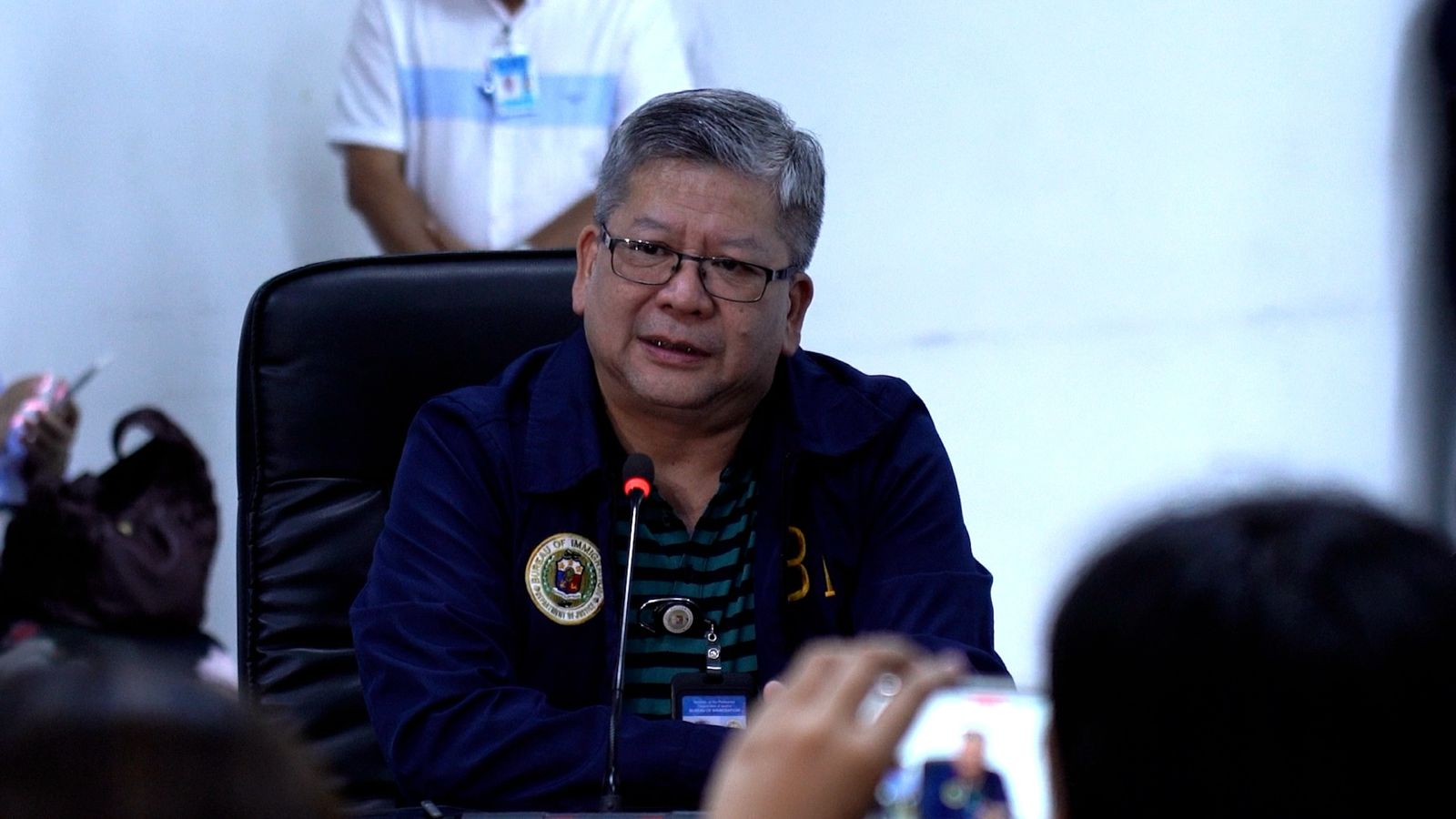
Bureau of Immigration Norman Tansingco talks to members of the media during a press conference with officials of the Department of Justice and National Bureau of Investigation (NBI) at the NBI-BSD office on Araneta Avenue in Quezon City on Friday, August 23, 2024. —Arnel Tacson/INQUIRER.net
MANILA, Philippines — The Bureau of Immigration (BI) on Wednesday said more than 100,000 foreign personnel of legal Philippine offshore gaming operators (Pogos) were given until Oct. 15 to voluntarily “downgrade” their work visas to avoid deportation.
This figure is more than four times the initial estimate of 20,000 foreigners working in Pogos that the BI earlier said would be affected and ordered to leave the country with the total ban announced by the President last month.
Speaking at a Senate budget hearing, Immigration Commissioner Norman Tansingco said the BI had already converted to tourist visas the employment visas, officially known as 9G visas, of about 2,000 foreign workers in compliance with President Marcos’ order to pull the plug on Pogos by the end of the year.
READ: BI gives foreign Pogo workers 2 months to leave
He said the immigration bureau, which is asking P5.7 billion from Congress to fund its operations in 2025, was closely coordinating with the state-run Philippine Amusement and Gaming Corp. (Pagcor) and the Department of Labor and Employment in phasing out the operations of all online gaming facilities.
“With the (President’s) announcement on banning of Pogos, they have no more reason to be working here,” Tansingco said in response to Sen. Risa Hontiveros’ question.
READ: Recto: Gov’t to help Filipino Pogo workers find new jobs
“We already started the ‘downgrading’ (of their) work visas to tourist visas. That will allow them to settle all their accountabilities, secure clearances, and leave the country within 59 days,” he said.
Following Marcos’ decision to shut down Pogos during his State of the Nation Address on July 22, the immigration chief said they immediately stopped accepting new applications and renewals of 9G visas for aliens employed by Pogo companies.
Gaming in ecozones
In deciding to ban Pogos totally, the President rued that the online gambling hubs became a vehicle for various internet scams, kidnapping, money laundering, human trafficking, and torture.
According to Tansingco, the BI had also rejected all pending applications for such work documents, including those filed by internet gaming licensees (IGLs), Pagcor’s new name for Pogos.
“By Oct. 16, we will start the cancellation of 9G visas, leading to the termination of all (Pogo) operations by Dec. 31, 2024,” Tansingco noted.
Hontiveros reminded the BI, Pagcor, and other involved state agencies that the President’s directive covered all Pogos, IGLs, and other similar gambling businesses, such as those granted licenses by special economic zones.
“I’m banking on what Pagcor and (other government agencies) said … all Pogos are banned as what the President (had ordered),” she pointed out.
There are 43 IGLs that have valid licenses to operate from Pagcor and all are covered by the President’s ban.
However, the case of internet gaming companies inside special ecozones, such as those in Cagayan, Bataan and Aurora, remains in question because the agencies operating them have their own regulatory framework on gambling activities in their jurisdictions distinct from that of Pagcor.
The Cagayan Export Zone Authority (Ceza), for instance, said that aside from being an ecozone with the power to issue fiscal incentives to locators, it is also a “Gaming Authority that acts as Regulator of the gaming jurisdiction, with the power to license Interactive Gaming and Land-based Gaming activities without needing to secure prior license or approval from Pagcor.”
Ensuring compliance
Sen. Nancy Binay, for her part, warned Tansingco that foreigners who would lose their work visas might still try to stay in the country by applying for retirement or investor visas.
“Is there a system to monitor that these 100,000 foreigners would really leave the country? They might just transfer to another (company),” Binay asked.
According to the BI chief, the immigration bureau had required foreign Pogo workers to submit valid plane tickets showing that they would leave the county within 59 days after their 9G visas were downgraded.
He said they had also met with the officials of the Board of Investments, the Philippine Retirement Authority, and other agencies authorized to issue visas to aliens.
“But we were informed that the outbound flights may not be enough since (December) is a peak period for (foreign) travels,” Tansingco said.
Sen. Grace Poe, who led the budget hearing as chair of the Senate finance committee, also noted a sharp decline in scam text messages following the closure of Pogo hubs.
“I would say (that it dropped) by over 90 percent. From getting up to four (scam messages) a day, now I get one or two a week,” Poe shared.